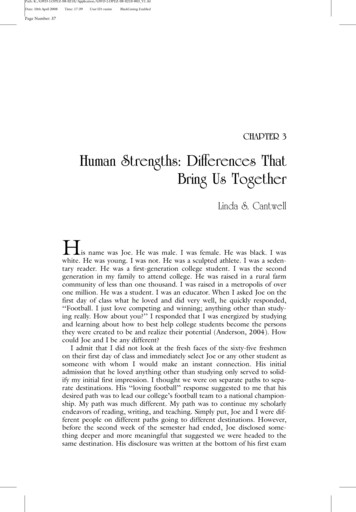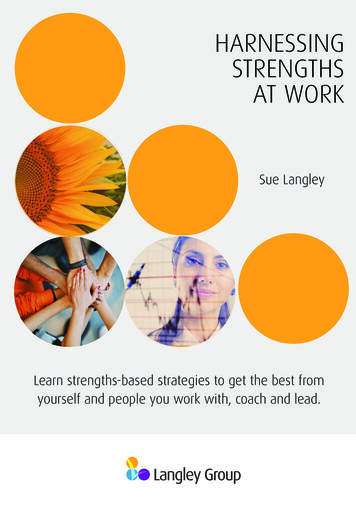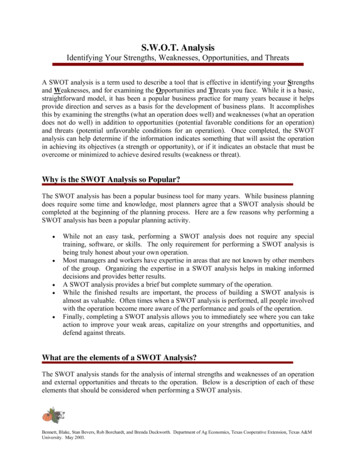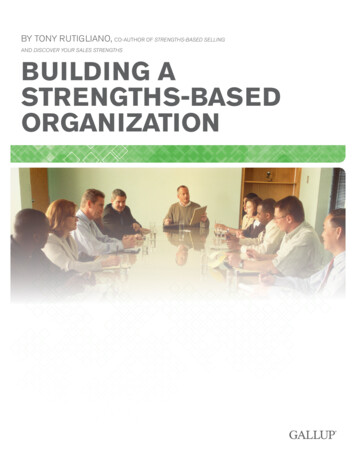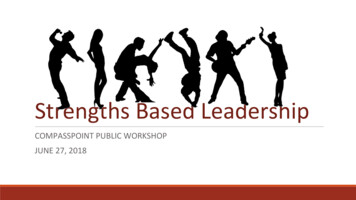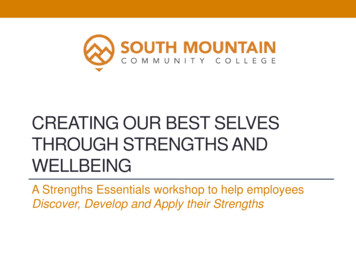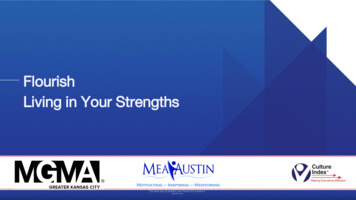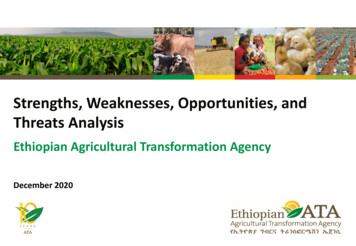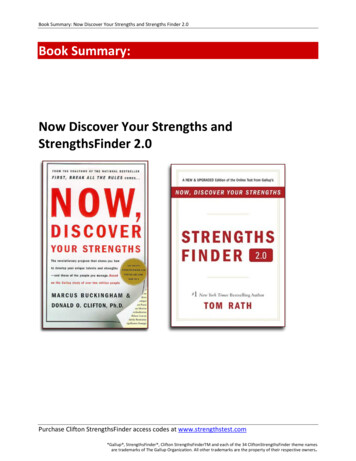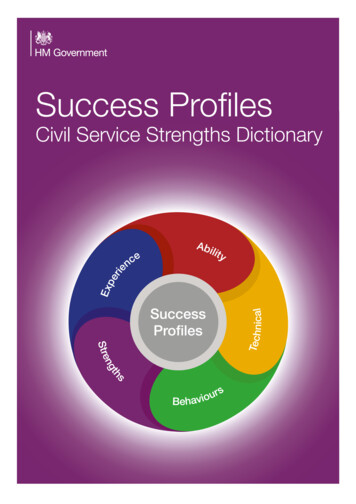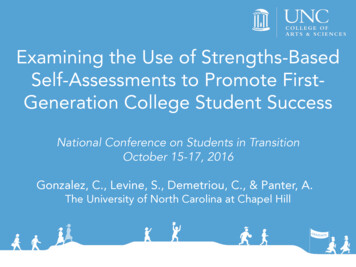
Transcription
Examining the Use of Strengths-BasedSelf-Assessments to Promote FirstGeneration College Student SuccessNational Conference on Students in TransitionOctober 15-17, 2016Gonzalez, C., Levine, S., Demetriou, C., & Panter, A.The University of North Carolina at Chapel Hill
Goals Explore how self-assessments can supportFirst-Generation College Students Offer an overview of self-assessmentprogramming at UNC-Chapel Hill Reflect on ways your campuses couldincorporate self-assessment programmingFINISHLINE.UNC.EDU
Agenda Overview of The Finish Line Project StrengthsFinder & Strong InterestInventory Program Development Program Assessment Challenges Application to Your Work Q&A/DiscussionFINISHLINE.UNC.EDU
3%First-Generation Students atUNC-Chapel Hill19%First- Generation,First-EntryContinuingGenerationFirst- Generation,Transfer78%FINISHLINE.UNC.EDU
FINISHLINE.UNC.EDU
Finish Line InitiativesConnect And Communicate With First-Generation StudentsSELF ASSESSMENTSStrengths-based assessments to enhance college knowledge and expectations.BUILD COMMUNITYCohort models to foster communication and share common experiences among males ofcolor.PARTNERSHIPSPartner with American Indian tribes to help support Native American studentsattending UNC.NEW PROGRAMSDevelop programs and support to assist rural student access and transition tocollege.FINISHLINE.UNC.EDU
Self-AssessmentsInventories that help students identify their interests, strengths, personalitytraits, values, majors and careers What self-assessments (MBTI, StrengthsFinder,Focus 2, etc ) are currently being used on your.campus? What is going well in the use of theseassessments? What are some challenges in the use of theseassessments?FINISHLINE.UNC.EDU
Self-Assessments at UNC-CH Student Success Navigator StrengthsFinder Strong Interest Inventory Focus 2 MBTI FINISHLINE.UNC.EDU
WhyStrengthsFinder ? FINISHLINE.UNC.EDU
Why the StrongInterestInventory ? FINISHLINE.UNC.EDU
FINISHLINE.UNC.EDU
Development ofProgramming Self-AssessmentTeam Training UCS Partnership Use of inventoriesacross campus Programming FormatFINISHLINE.UNC.EDU
Workshop OutlineFINISHLINE.UNC.EDU
Finish Line Project Studies
“I am most proud of my strengthas an achiever. I feel like there’snothing I can’t do when I reallyset my mind to it.”“I learned that I am verystrong-willed and standup for my story andfuture plans, even whenothers don’t agree withthem or understand.”“I’m most proud of empathy. It aligns with my valuesand I want people to feel supported and understood.”“I will try to use my strengths toachieve my goal of stepping outof my comfort zone to try newthings.”“I will use my strengths tonot let problems stop mefrom seeing differentsolutions. “FINISHLINE.UNC.EDU
Challenges and Considerations Budget: Strengths Quest: 10 per code Strong Interest: 10- 16 per assessment, needtrained interpreter Assessment Completion/Communication: Student completion of assessments prior toworkshop Student Attendance Where/when to hold workshops? How to communicate value?FINISHLINE.UNC.EDU
Self-AssessmentProgramming onYOUR CampusFINISHLINE.UNC.EDU
FINISHLINE.UNC.EDU
Questions?FINISHLINE.UNC.EDU
Contact UsCarmen Gonzalezcdgonz@email.unc.eduSharon Levinesplevine@email.unc.eduCynthia Demetrioucyndem@email.unc.eduAbigail Panterpanter@unc.eduFINISHLINE.UNC.EDU
AcknowledgementsThis research is part of the Finish Line Project (P116F140018;Panter, PI; Demetriou, Executive Director), which is funded bythe U.S. Department of Education’s “First in the World” grantprogram. The opinions expressed are those of the authors anddo not represent the views of the U.S. Department ofEducation.
The Finish Line ProjectRESEARCH AND PRACTICE TO HELP FIRST-GENERATION COLLEGE STUDENTS SUCCEEDFunded by a U.S. Department of Education grant, The Finish Line Projectinitiates and evaluates innovative programs for student success atThe University of North Carolina at Chapel Hill. Project findings willinform future practices at the University and across the nation.INITIATIVES TO HELP FIRST-GENERATION COLLEGE STUDENTSCAROLINA FIRSTS1First-generation college students arefrom a family in which neither parenthas a four-year undergraduate degree.At UNC, we proudly call these students"Carolina Firsts." The Finish Line Projectsupports all Carolina Firsts including:Connect And CommunicateWith First-Generation StudentsRURAL STUDENTSEighty of the 100 counties inNC are rural. Studies indicatethe number of rural studentsgoing to college is increasing.NATIVE AMERICANSAmerican Indians in highereducation have more than doubledin the last 30 years. Universitiesmust intentionally engage students,families and communities.MEN OF COLOR COACHAPPROACH STUDYThis study describes the experiencesof a cohort of undergraduatemales of color participating in aprogram designed to engagestudents in academic coachingexercises such as goal setting,monitoring goal progress, developinga supportive networks, usingresources on campus, and gaininga sense of belonging on campus.2Enhance CurriculumThrough Active LearningSELF-ASSESSMENTSStrengths-based assessments toenhance college knowledge andexpectations.TRANSITION COURSESOffer multiple courses tohelp students navigate criticaltransitions.COMMUNITY BUILDINGCohort models to fostercommunication and sharecommon experiences amongunderrepresented males.GATEWAY COURSESReview and redesign gatewaySTEM courses.PARTNERSHIPSPartner with American Indian tribesto help support Native Americanstudents attending UNC.LEARNING COMMUNITIESCreate faculty learningcommunities to supportactive learning.NEW PROGRAMSDevelop programs and supportto assist rural student access andtransition to college.COMMUNITY COLLEGESMap STEM curriculumon campus and at localcommunity college.3Advise And SupportFirst-Generation StudentsMEASUREAcademic and psychosocial factorsamong FGCSCOORDINATIONCoordinate efforts forCarolina Firsts acrosscampus.College knowledge and expectationsChanges in student learning patterns,attitudes, and behaviorsThe acquisition of knowledge or skillsas a result of interventionsChanges in faculty instructionaltechniques, attitudes, and behaviorsDESCRIBEADVISINGOffer academic advisingspecifically to meet theneeds of first-generationcollege students.Academic success among FGCSoverall and by subgroupsMicro-aggressions and microaffirmations among FGCSPathways to degree completion inthe sciencesFaculty motives for course redesignCOACHINGTrain academiccoaches to supportundergraduates.Perspectives and behaviors amongFGCS regarding applying to graduateschoolASSESSStrategies for enhancing collegeknowledge and expectationsModels for academic coachingTRANSFER STUDENTSInnovative, educational programming is needed to supporttransfer students especiallycommunity college transfers.RESEARCH OBJECTIVESStrategies for promoting selfregulated learningTHE CAROLINA FIRSTS EXPERIENCEENStrategies for course redesignINTROR O LLSTEMGGRADUATER A D U AT ECoachEfforts begin prior to enrollmentto build college knowledge, sethelpful expectations, and buildresources for success.Students connect with supportivecommunities of students withsimilar backgrounds andexperiences.Students enroll in newly designedtransition and gateway courses to aidtheir progress in STEM and other fieldsof study.Faculty, advisors, and academiccoaches help students navigatethe research university.Students fulfill degreecompletion requirements andmove on to graduate schooland career opportunities.
Strengths and Strong on YOUR CampusThe following questions will guide you in brainstorming ideas to bring similar self-assessmentprogramming to your campuses.AreStrengthsFinder and/or StrongInterest Inventory currently in use onyour campus?Where are these assessment(s) being used?Student PopulationWho would you market your self-assessment programming to? Why would this bebeneficial to this group?How are these assessment(s) being used?What would your communication strategy look like?PartnershipsWho on campus might be interested in partnering with you?ProgrammingFormatWhen/where would you hold this programming on campus? How often?What might your programming look like?FundingWhat potential funding sources can you identify?
set my mind to it.” “I will try to use my strengths to achieve my goal of stepping out of my comfort zone to try new things.” “I learned that I am very strong-willed and stand up for my story and future plans, even when others don’t agree with them or understand.” “I will use
